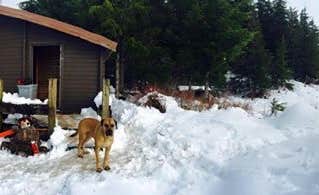Cabins near Craig, Alaska offer rustic wilderness experiences in southeast Alaska's temperate rainforest environment. Located on Prince of Wales Island, these Forest Service accommodations provide shelter at elevations ranging from sea level to 600 feet, with annual rainfall exceeding 120 inches. Most cabins require advance planning for transportation logistics, as many are accessible only by boat or require significant hiking.
What to do
Wildlife viewing opportunities: Black Bear Lake Cabin provides excellent wildlife watching platforms where visitors can observe deer, black bears, and various bird species in their natural habitat. The cabin sits on an elevated bank overlooking a productive salmon-spawning stream.
Water activities: Twelvemile Cabin offers prime opportunities for kayaking and crabbing. "Great crabbing in bay directly in front of cabin. All you need is a Canoe and a crab pot!" notes Katie R. The saltwater inlet provides protected waters ideal for beginners and experienced paddlers alike.
Beach exploration: Point Amargura Cabin visitors can access extensive beachcombing opportunities along the shoreline. The cabin's isolation allows for uninterrupted exploration of tidal pools, driftwood, and marine life.
What campers like
Stellar night views: Camping near Craig allows for exceptional stargazing due to minimal light pollution. "Make sure you look UP because the night sky is amazing," shares Katie K. about her experience at Twelvemile Cabin.
Waterfront locations: Barbara F. describes Twelvemile Cabin as a "Beautiful semI-remote location. Sleeping for six, beachfront and lots of places to explore. Accessible both by road or via ocean." The cabin's positioning provides direct access to shoreline activities.
Private road access: Some cabins offer remarkable seclusion with dedicated access routes. Polk Camp features a gated private road that enhances security and privacy. Katie R. notes it has a "Ranch style building was converted from a surveyor camp to a rental cabin 2 years ago. Drive right up to it on your own gated road."
What you should know
Transportation logistics: Many cabins require specialized transportation. Control Lake Cabin necessitates a small rowboat trip from the road to reach the structure. "You have to take a boat (small rowboat) from the road to the cabin. It's secluded and great for a group of people to get away," explains Shawna M.
Water source limitations: Most Forest Service cabins lack running water, requiring visitors to pack in their own supply or use water filtration systems with nearby lakes or streams as sources. Exceptions exist but should be verified before arrival.
Limited restroom facilities: Only a few cabins provide toilet facilities. Barbara F. mentions Twelvemile Cabin has an "Outhouse privy, counter space and wood stove." Most other cabins require visitors to bring portable toilets or use appropriate wilderness bathroom practices.
Tips for camping with families
Bring alternate sleeping arrangements: Cabin sleeping platforms can be uncomfortable for smaller children. One visitor recommends bringing sleeping pads and extra blankets to create comfortable sleeping spaces on cabin floors.
Plan for indoor activities: Given the frequent precipitation in the Craig area, families should pack board games, cards, and other entertainment options for inevitable rainy days when outdoor exploration becomes challenging.
Consider cabin access difficulty: When traveling with young children, select cabins with easier access routes. Log Cabin RV Park and Resort provides drive-up accommodations suitable for families with small children or mobility concerns, eliminating difficult hikes or boat transfers.
Tips from RVers
Limited hookup options: RV campers should prepare for dry camping when visiting the Craig area. The Log Cabin RV Park and Resort accommodates recreational vehicles but doesn't provide standard hookups found at larger facilities.
Road condition awareness: Prince of Wales Island features numerous unpaved and logging roads that may challenge larger RVs. Several visitors recommend scouting routes before attempting them with larger vehicles, particularly after heavy rainfall periods.
Pack appropriate power solutions: With limited electrical options, RV campers should bring sufficient battery power, solar options, or fuel for generators where permitted. Consider cabin stays as alternatives when electrical needs are significant.




